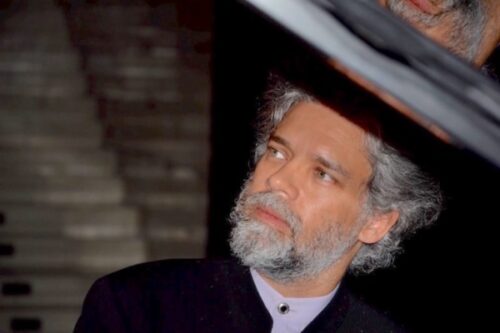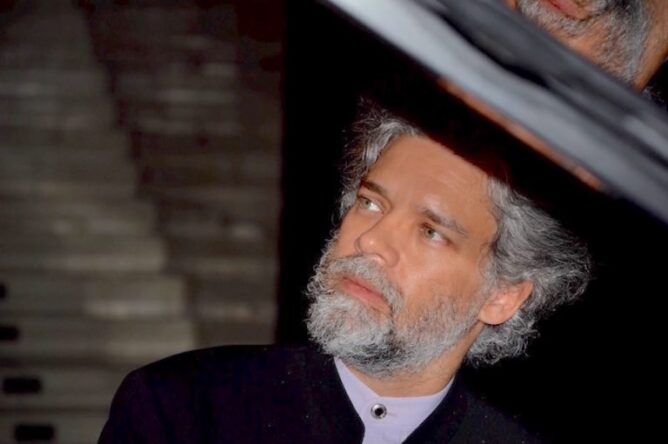 United Kingdom Chopin, Murail, and Beethoven: François-Frédéric Guy (piano). Wigmore Hall, London, 3.10.2022. (MB)
United Kingdom Chopin, Murail, and Beethoven: François-Frédéric Guy (piano). Wigmore Hall, London, 3.10.2022. (MB)

Chopin – Nocturne in C minor, Op.48 No.1; Ballade No.1 in G minor, Op.23; Piano Sonata No.3 in B minor, Op.58
Tristan Murail – Impression, soleil levant
Beethoven – Piano Sonata No.32 in C minor, Op.111
In this Wigmore Hall recital, François-Frédéric Guy took a fresh look at well-known piano masterpieces, and presented a work new this year, written for him by Tristan Murail. Dedicated to the memory of two close friends, Nicholas Angelich and Lars Vogt, it was an interesting concert in the best sense, with nothing taken as read and much to have one think.
The first half was dedicated to Chopin, opening with the C minor Nocturne, Op.48 No.1. Guy married harmony to rhythm in its first section, immediately conveying a sense of the inexorable. Dignified, never remotely sentimental, it both prepared the way for and necessitated contrast in an ever-broadening middle section, which in turn resulted in a modified return that evoked the spirit rather than the letter of synthesis. The G minor Ballade, both grandly rhetorical and intimate in its whispered confidences, evinced kinship with the Nocturne, whilst emerging free of evident relation to any particular pianistic tradition. Again, it was resolutely sentimental, even to the point at which I should not have minded a little old-world charm; but this was not an old-world performance, and why should it be? It spoke and increasingly sang with an integrity, fire, and miraculous concision that were its own: more important than being note-perfect.
The B minor Sonata began with a directness difficult not to think of as ‘Beethovenian’, though naturally soon proceeded in a different direction. The first movement reminded me at times of Liszt, and not only (I think) on account of the key. Not that it was especially seductive; this was, if anything, a performance notable for its lack of perfume. Paradoxically, one had to listen for its lyricism; yet, when one did, it was there. Likewise in the scherzo, though perhaps less surprisingly there: it sounded as if a piece of post-impressionist play with light on water — sometimes quite troubled water. A forthright Largo led to a marauder icy even in heat of a finale. Much was unexpected, yet never did it sound unreasonable. Guy had one listen.
Murail’s Impression, soleil levant seemed, especially in the context of such performances, more preoccupied with the nature of sound: in general, and piano sound in particular. More flexible, even melting, both inside the piano and on its keys, it nonetheless had melodic lines sound as if taken from Chopin and placed in radically new harmonic context. Occasionally, the ghost of Debussy rattled its chains, but the way of hearing encouraged was different. This seemed to me a commanding performance, even on a first hearing (for me) presenting the work as it should.
Finally, we heard Beethoven’s last piano sonata, Op.111, a work greatly admired by Chopin (amongst many others). Its opening diminished seventh leaps sounded as if on loan from Chopin or Liszt (the B minor Sonata in particular), offering a fine sense of transition to Beethoven’s world: steeped here as much in the fantasias, especially that also in C minor, of Mozart as in the Romanticism of Beethoven’s own century (by now). Whatever the antecedents or successors, that fantasia-like quality and recognisably Beethovenian fury were strongly to the fore in the first movement. Phrases melted, to be sure, yet within that initially constructed frame. Flashes across the canvas — striking clarity of counterpoint in the development, extraordinary harmonic twists in the recapitulation — had me once more imagining I was hearing this music for the first time. The Arietta that opens the second and final movement sang with just the right sort of quiet dignity. Guy’s ear (and fingers) for telling detail ensured that, again, this corresponded only to a new vision, or so it seemed, beholden to no particular view from the past. The first variation continued and intensified; its successor worked magic that sounded, for all its familiarity, once more new, the third variation still more so. And so, the wondrous voyage continued, neither entirely familiar nor unfamiliar. Through a gossamer filigree extending already, so it seemed, beyond Mendelssohn, a snow-like brilliance on the white keys, a rapt sublimity that could never be mistaken for anyone else’s, and so much more, there was no doubt this was Beethoven — the cruel loss of whom in the pandemic year of 2020 some of us still feel and perhaps always will. Yet this was not pious or precious Beethoven; it lived and breathed in a way that rightly took nothing for granted.
Mark Berry
